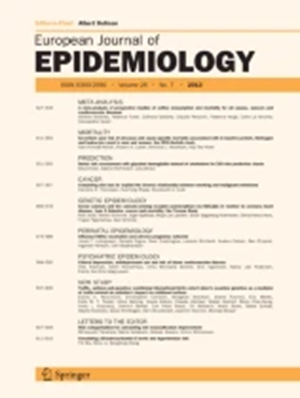队列概况:广州老年纵向动态健康(GOLD-Health)队列。
IF 5.9
1区 医学
Q1 PUBLIC, ENVIRONMENTAL & OCCUPATIONAL HEALTH
引用次数: 0
摘要
广州老年人纵向动态健康(GOLD-Health)队列研究是一项基于人群的前瞻性队列研究,旨在调查广州成年人非传染性疾病(NCDs)的相关危险因素。广州是中国最发达和人口最密集的城市之一。从2018年1月1日至2020年12月31日,737,863名参与者(平均年龄= 71.8岁,58.9%为女性)完成了基线数据收集,其中约92.1%的参与者捐献了血液样本。基线数据收集包括各种因素,包括一般特征、社会经济因素、生活习惯、烹饪燃料的使用和生活水平,以及慢性病的病史。此外,由训练有素的医务人员进行物理和生化指标检查。采用了两种互补的后续办法来验证和丰富关于死亡率和非传染性疾病结果的结果信息,确保其可靠性和全面性。首先,与广州市卫生健康委员会的电子记录进行常规联系,提供了对死亡事件和参与者住院和门诊就诊情况的持续监测。其次,通过电话访谈和定期面对面调查进行定期随访,以收集有关健康状况、生活方式变化、新诊断的疾病和医院记录中未记录的自我报告事件的详细信息。这种综合方法确保了队列数据的完整性和准确性。该队列可以作为慢性病管理的决策工具,并有助于评估现实世界条件下的科学发现。本文章由计算机程序翻译,如有差异,请以英文原文为准。
Cohort profile: the Guangzhou older longitudinal dynamic health (GOLD-Health) cohort.
The Guangzhou Older Longitudinal Dynamic Health (GOLD-Health) Cohort is a prospective population-based cohort study aimed at investigating the risk factors associated with non-communicable diseases (NCDs) among adult individuals in Guangzhou, one of China's most developed and densely populated cities. From 1 Jan 2018 until 31 Dec 2020, 737,863 participants (mean age = 71.8 years, 58.9% were female) completed baseline data collection, among which approximately 92.1% donated blood samples. Baseline data collection comprises various factors, including general characteristics, socio-economic factors, lifestyle habits, cooking fuel usage and living standards, and medical history of chronic diseases. Additionally, physical and biochemical indicator examinations are conducted by trained medical staff. Two complementary follow-up approaches are utilized to validate and enrich the outcome information on mortality and non-communicable disease outcomes, ensuring its reliability and comprehensiveness. First, routine linkage with the Guangzhou Municipal Health Commission's electronic records provides continuous monitoring of mortality events and participants' inpatient and outpatient hospital visits. Second, periodic follow-up is conducted through telephone interviews and regular face-to-face surveys to collect detailed information on health status, lifestyle changes, newly diagnosed conditions, and self-reported events not captured in hospital records. This combined approach ensures both the completeness and accuracy of the cohort data. This cohort may serve as a decision-making tool for chronic disease management and contributes to the evaluation of scientific findings under real-world conditions.
求助全文
通过发布文献求助,成功后即可免费获取论文全文。
去求助
来源期刊

European Journal of Epidemiology
医学-公共卫生、环境卫生与职业卫生
CiteScore
21.40
自引率
1.50%
发文量
109
审稿时长
6-12 weeks
期刊介绍:
The European Journal of Epidemiology, established in 1985, is a peer-reviewed publication that provides a platform for discussions on epidemiology in its broadest sense. It covers various aspects of epidemiologic research and statistical methods. The journal facilitates communication between researchers, educators, and practitioners in epidemiology, including those in clinical and community medicine. Contributions from diverse fields such as public health, preventive medicine, clinical medicine, health economics, and computational biology and data science, in relation to health and disease, are encouraged. While accepting submissions from all over the world, the journal particularly emphasizes European topics relevant to epidemiology. The published articles consist of empirical research findings, developments in methodology, and opinion pieces.
 求助内容:
求助内容: 应助结果提醒方式:
应助结果提醒方式:


